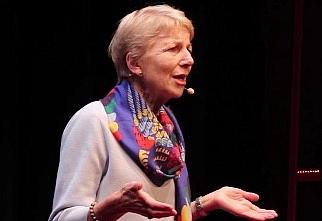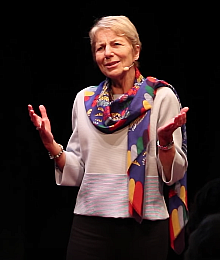From the heart, from the brain: A TEDx talk examines shaken baby syndrome

Dr. Waney Squier at her TEDx talk.
Pediatric neuropathologist Dr. Waney Squier has distilled decades of professional and personal experience into a potent and provocative TEDx talk, “I believed in Shaken Baby Syndrome until science showed I was wrong.”
While telling her own story with calm, compelling intensity, she also describes the pain inflicted on innocent families by misguided accusations of abuse and documents the refusal of the legal and medical communities to accept the unwelcome truth about their flawed theory.
“By ignoring the science and adopting an unproven hypothesis, doctors have done great harm,” she concludes, “and have led the courts astray."

Three years later, Linda’s conviction was overturned on appeal. “Her name was cleared, but her life was ruined,” Squier says. Her parents had died and her husband had left her. Her fourth child, a little girl born in prison, had been taken from her at birth and placed for adoption, and even after her exoneration, Linda was forbidden from attempting contact.
When Linda was first accused, the police had called in Dr. Squier, an expert on infant brain pathology. After examining the brain, she had endorsed the opinion of the other doctors, that it was a case of shaken baby syndrome. “They believed in it, and I believed in it,” she grimaces, “and so my report was part of the evidence that cost Linda so much.”
Dr. Squier says her own doubts about shaking theory started when another neuropathologist, Dr. Jennian Geddes, published research suggesting that the damage in presumed shaking cases resulted from lack of oxygen, not from direct violence. Dr. Squier recalls:
Back in 2001, the Geddes research stopped me in my tracks. It wasn’t what I had expected. So I read everything I could about shaken baby syndrome, and as a scientist, I’m embarrassed to admit to you I hadn’t done so before. I’d been making this diagnosis on the basis of my uncritical acceptance of what was in the textbooks and what I’d been taught. I was startled to learn that there was no scientific foundation for the hypothesis.
No one has ever witnessed a shaking assault that resulted in the triad, she reports. Laboratory research and biomechanical calculations have only cast doubt on the theory, and past experience with front-facing car seats tells us that whiplash forces cause fractures and dislocations in the neck, not intracranial bleeding and swelling.

But her willingness to speak out against the common knowledge resulted in criticism from colleagues, scoldings from judges, and complaints to the authorities. In the spring of 2016, after hearings triggered by a police complaint to the General Medical Council, she temporarily lost the right to practice medicine, until a higher court reinstated her, declaring most of the first findings “unsustainable.” She is still prohibited from testifying in British courts for another year and a half.
The actions against her have successfully stifled the voices of dissent, Dr. Squier argues, leaving innocent families “defenseless” against their accusers. “Back in 2005, Linda had seven medical experts to support her. Today she would be likely to have none.”
Some other key points from Dr. Squier’s talk:
So today, as I stand here, I am sure that shaking can harm babies, and we certainly shouldn’t shake babies. But nearly 50 years of research has failed to provide us with the justification to make the assumption that a baby who has the triad or any of its components must have been shaken.
If we do nothing, then ordinary people, people who have already suffered the tragedy of the death of a baby, will continue to have their families torn apart by incorrect and unscientific opinions…
If we do nothing, this travesty will continue… this willful refusal of the courts and the doctors advising them to recognize the science that shows they are wrong.
But you might have other favorite quotes. I suggest you watch the entire talk.
If you are not familiar with the debate about shaken baby theory, please see the home page of the author's personal blog.

